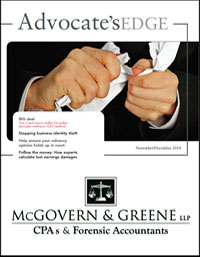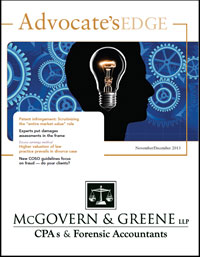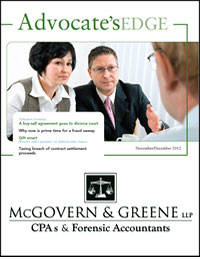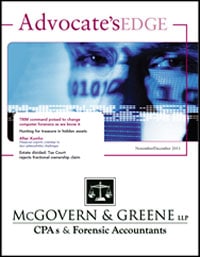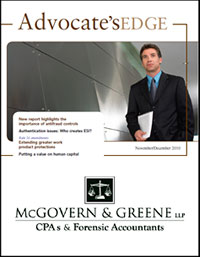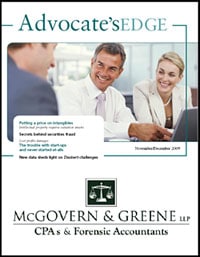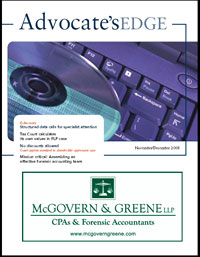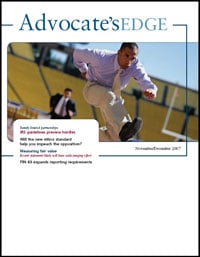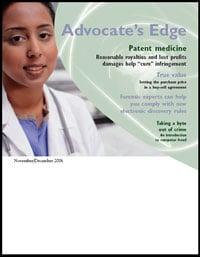Advocate’s Edge
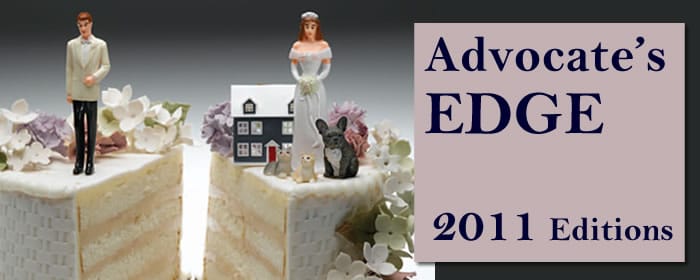
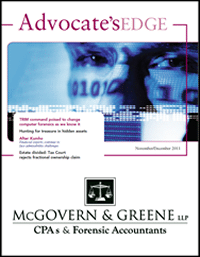 NOV/DEC 2011 Issue of Advocate’s Edge
NOV/DEC 2011 Issue of Advocate’s Edge
TRIM command poised to change computer forensics as we know it
Over the past decade, attorneys have come to recognize the valuable role computer forensics play in recovering key financial information from hard drives. But the increasing availability of the TRIM command in computer operating systems is poised to dramatically reshape the field of computer forensics. This article explains how the command purges data completely, so that not even remnants are left behind for experts to subsequently dig up and reassemble. But there are also ways to work around TRIM.
After Kumho
Financial experts continue to face admissibility challenges
In 1999, the U.S. Supreme Court’s decision in Kumho Tire Co. v. Carmichael clarified that the Daubert criteria for admissibility of expert testimony applies to all types of experts. This article discusses a recent PricewaterhouseCoopers (PwC) study that sheds light on some of the factors that determine the admissibility of expert testimony. A sidebar talks about correlations the study found between the frequency of challenges and whether the expert served the defendant or the plaintiff.
Estate divided: Tax Court rejects fractional ownership claim
Does the mere execution of grant deeds transferring undivided interests in property create fractional interests? No, according to the U.S. Tax Court. This article looks at a case in which the decedent had executed a grant deed transferring undivided one-fifth interests in land to each of his five children as tenants-in-common. But, because he retained a life interest in the property by retaining control of it, the ownership wasn’t split until his death. This meant that the entire value of the property was includible in the gross estate.
Hunting for treasure in hidden assets
In a variety of litigation contexts — such as fraud investigations, shareholder disputes, divorce and business valuation — forensic accountants use several techniques to uncover and demonstrate the existence of assets. This article summarizes two important methods: performing net worth analysis and reviewing tax returns.
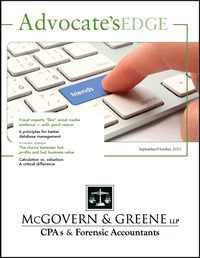 SEP/OCT 2011 Issue of Advocate’s Edge
SEP/OCT 2011 Issue of Advocate’s Edge
Fraud experts “like” social media evidence — with good reason
Thanks to the surging popularity of social networking media, investigators can now tap into a wealth of potential evidence that was nearly impossible to find only a few years ago. This article discusses the fact that many people are posting incriminating material online, and summarizes the regulatory limitations that apply when it comes to obtaining evidence from social media. A sidebar looks at the use of “social network analysis” (SNA) to detect sophisticated fraud schemes.
6 principles for better database management
As more and more organizations store information in searchable databases, disputes over the discovery of that data have become increasingly common in civil litigation. This article notes that, in response, the Sedona Conference — an influential think tank of leading jurists, lawyers, experts and consultants — has developed six principles to simplify discovery of database information and clarify the obligations of both requesting and producing parties.
Economic damages
The choice between lost profits and lost business value
Arriving at a damages award for a plaintiff’s loss of economic benefits may involve calculating lost profits, lost business value and, in some cases, both. But, as this article notes, the distinction between lost profits and lost value can be confusing. Attorneys need to understand the difference and when each method might apply so their clients don’t accidentally “double dip” when calculating damages.
Calculation vs. valuation: A critical difference
Attorneys and their clients sometimes ask professional valuators to provide preliminary estimates — called “calculations” — rather than full-fledged business appraisals. Such requests might save money up front, but this article discusses a recent Iowa case that illustrates why calculations are no substitute for valuations.
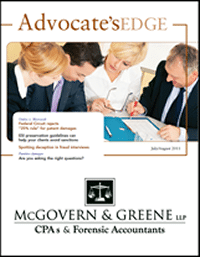 JUL/AUG 2011 Issue of Advocate’s Edge
JUL/AUG 2011 Issue of Advocate’s Edge
Uniloc v. Microsoft
Federal Circuit rejects “25% rule” for patent damages
Financial experts may use certain theoretical tools — or rules of thumb — to calculate infringement damages. But in Uniloc USA Inc. v. Microsoft Corp., the U.S. Court of Appeals for the Federal Circuit made it clear that experts should base their calculations on a case’s facts, rather than rely on abstract theoretical tools, especially those used arbitrarily. This article explains why the court decided the commonly used “25% rule” and “entire market value” rule were improper in this case. A sidebar notes that the court reaffirmed the use of the Georgia-Pacific factors to frame the question of reasonable royalties in patent infringement cases.
ESI preservation guidelines can help your clients avoid sanctions
The quantity and numerous sources and formats of electronically stored information (ESI) can make satisfying the duty of preservation difficult. The Delaware Court of Chancery has attempted to address the problem by releasing some guidelines on ESI preservation. This article discusses some of these guidelines, which can help U.S. companies incorporated in Delaware avoid sanctions.
Spotting deception in fraud interviews
Even employees innocent of occupational theft may be less than honest during fraud interviews. Fortunately, experienced fraud investigators are skilled at spotting deception in perpetrators and bystanders alike. This article describes how investigators discern the verbal and nonverbal cues that can indicate who may know of fraud — whether committed by themselves or someone else.
Punitive damages
Are you asking the right questions?
Although the U.S. Supreme Court has suggested that there may be constitutional limits on the size of punitive damages awards, an appropriate award generally depends on the defendant’s financial condition. Professional damages experts can help lawyers ask the right questions and present information in court that will bolster their case. This article shows how the plaintiff’s or defendant’s counsel can address issues such as who specifically is responsible for the alleged wrongdoing, how they profited from it, and their ability to pay.
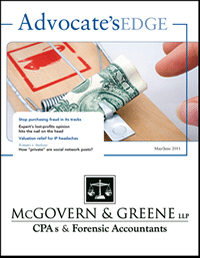 MAY/JUN 2011 Issue of Advocate’s Edge
MAY/JUN 2011 Issue of Advocate’s Edge
Stop purchasing fraud in its tracks
Purchasing fraud is one of the most prevalent forms of occupational theft. The temptation to steal can be strong for employees with financial troubles and access to their company’s accounts. This article describes common forms of purchasing fraud, and explains how companies can detect possible fraud, and the methods that forensic accountants use to investigate possible schemes. A sidebar summarizes the findings of an Association of Certified Fraud Examiners’ survey on fraud perpetrators.
Expert’s lost-profits opinion hits the nail on the head
Establishing lost-profits damages can prove difficult — especially when a case involves a new business in a volatile industry. But a recent breach of contract and fraud case suggests that solid testimony from a qualified financial expert can help attorneys make their case. This article discusses the case, in which a restaurant owner claimed lost profits due to the developer’s failure to provide promised valet parking services. The defendant disagreed with the amount of damages that were awarded, so the appeals court studied the methodology used by the plaintiff.
Valuation relief for IP headaches
Intellectual property (IP) is a significant source of value for many companies these days, but it can be a pain to appraise. In fact, the three most commonly applied valuation methods — market, income and cost — aren’t always effective when valuing IP. In many cases, professional valuators turn to the relief from royalty (RFR) method for these tricky assets. This article explains why the RFR method can be effective.
Romano v. Steelcase
How “private” are social network posts?
Social networking sites such as Facebook and MySpace have become a rich source of evidence for attorneys. This article discusses one case in which a woman’s public Facebook and MySpace pages suggested that her disability claim might be fraudulent. The employer sought access to her private pages, which they believed might strengthen their case. The court addressed the plaintiff’s claims of an expectation of privacy.
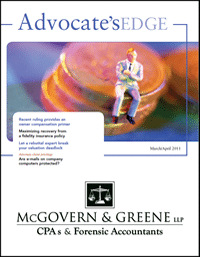 MAR/APR 2011 Issue of Advocate’s Edge
MAR/APR 2011 Issue of Advocate’s Edge
Recent ruling provides an owner compensation primer
It’s not unusual for the IRS to question the compensation that closely held companies pay their owners. But a recent Tax Court decision provides a primer on the factors that often come into play in such cases. This article discusses the case, in which a company CEO appealed the IRS’s reduction of what he felt was “reasonable” compensation, and looks at the five factors the court used in its determination.
Maximizing recovery from a fidelity insurance policy
Some companies may have fidelity insurance to protect themselves from fraud losses. Unfortunately, owning this type of policy doesn’t guarantee claim acceptance: Claimants must follow strict procedures, and claims often are contested. This article explains how fraud experts can help companies build stronger claims. Solid proof-of-loss documentation is essential and claimants must provide specific information, which is outlined in the article’s sidebar.
Let a rebuttal expert break your valuation deadlock
Professional valuators use a variety of methods and inputs when appraising a business, making it easy for two experts working in good faith to reach different conclusions. In such situations, litigating parties must find a way to break the deadlock. This article discusses how a rebuttal report can help them do just that — as well as reduce overall valuation costs.
Attorney-client privilege
Are e-mails on company computers protected?
In an era when employers regularly provide employees with electronic communication equipment, questions often arise about employees’ expectations of privacy. This article examines one employment discrimination case, in which a court considered whether e-mails that the employee had sent her attorney using an employer-owned laptop were protected by attorney-client privilege.
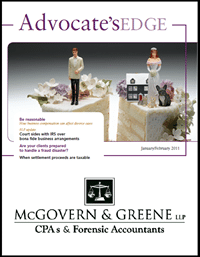 JAN/FEB 2011 Issue of Advocate’s Edge
JAN/FEB 2011 Issue of Advocate’s Edge
Be Reasonable
How business compensation can affect divorce cases
When a divorcing spouse owns or is a partner in a closely held business, its value — particularly the amount of compensation the business provides to its owners — can play a significant role in the divorce case’s financial outcome. This article discusses the factors a professional valuator considers to determine reasonable compensation. A sidebar talks about issues that affect the credibility of expert testimony on reasonable compensation.
FLP update
Court sides with IRS over bona fide business arrangements
Family limited partnerships (FLPs) offer advantages for some taxpayers, but the IRS continues to challenge these arrangements on several theories. This article summarizes one recent case, Holman v. Commissioner. In Holman, the Eighth Circuit Court of Appeals held that, because the FLP at issue didn’t satisfy the “bona fide business arrangement” requirement, its transfer restrictions shouldn’t be considered when calculating the valuation discount for shares of the FLP.
Are your clients prepared to handle a fraud disaster?
Few businesses have considered — let alone documented — what they’d do if they found employees embezzling funds, stealing inventory or fudging financial statements. This article looks at the importance of having a fraud contingency plan, and what such a plan entails. It also describes how forensic accountants and computer experts can preserve evidence and conduct interviews in a way that helps establish their validity in court.
When settlement proceeds are taxable
The Sixth Circuit Court of Appeals has affirmed a Tax Court ruling that settlement proceeds received for false imprisonment aren’t excludable from taxable income under Internal Revenue Code Section 104(a)(2). This article discusses the opinion, which offers a valuable reminder of the two-pronged test for exclusion of income.
This publication is distributed with the understanding that the author, publisher and distributor are not rendering legal, accounting or other professional advice or opinions on specific facts or matters, and, accordingly, assume no liability whatsoever in connection with its use.
GFAS Advocate's Edge Archives
Expert Forensic Accounting Services
Chicago | Las Vegas
FORENSIC ACCOUNTING
SERVICES
Insurance Claims
Accounting Investigations
Mergers & Acquisitions
Due Diligence Reviews
Dispute Advisory Services
Special Examinations
Contract Audits and Recoveries
LITIGATION SERVICES
Expert Witness Testimony
Commercial Damages
Shareholder/Partner Disputes
Bankruptcy and Insolvency
CPA Malpractice Claims
Contract Disputes
Estate and Trust Disputes
Data Mining & Electronic Discovery
FRAUD EXAMINATIONS

